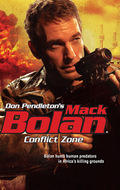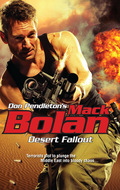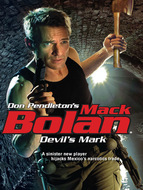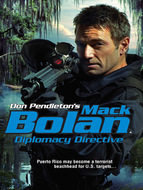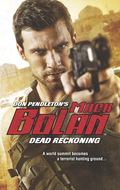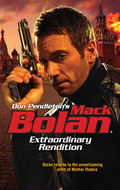Kitap dosya olarak indirilemez ancak uygulamamız üzerinden veya online olarak web sitemizden okunabilir.
Kitabı oku: «Extraordinary Rendition», sayfa 2
CHAPTER TWO
Washington, D.C., two days earlier
The International Spy Museum was located at 800 F Street Northwest, one block east of Ford’s Theater and one block north of FBI Headquarters, directly opposite the Smithsonian American Art Museum and the National Portrait Gallery. It occupied five buildings, renovated at a cost of forty million dollars, and had earned its keep with interest since it opened in July 2002.
The museum had no parking lot of its own, so Bolan left his rental in a commercial garage two blocks over and walked back, still early, enjoying the sunshine. Spring was being kind to Washington, so far.
He doubted that it would be kind to him.
Only a few museums in Washington charged entrance fees. The Spy Museum was one of them, collecting twenty dollars from adults and shaving off a buck for active-duty members of the military. Entry through a “controlled” checkpoint included receipt of cover profiles for each visitor, with instructions to memorize the details in five minutes flat. Fledgling spies received a simple “mission,” but weren’t required to complete it. Staff “police” stopped visitors at random, grilling them for details of their cover, adding just a hint of spice. For true enthusiasts, the interactive Operation Spy pavilion offered simulations that included detection and disarming of a nuclear device.
Bolan went through the motions and moved on, idling past some of the museum’s six hundred exhibits depicting the evolution of espionage from ancient Greece and Rome to the twenty-first century. At any other time, it would have piqued his interest, but he had a real-life mission of his own.
Or would have, very shortly.
Keeping an eye on the time, Bolan drifted toward the museum’s Spy City Café, a snack shop for guests whose budgets wouldn’t cover dining at the adjacent, upscale Zola Restaurant. He wasn’t hungry, but he planned on meeting someone there.
And his contact, as always, was punctual.
“The fish is red,” Hal Brognola said as he sidled up to Bolan.
“Guess I’ll have the chicken, then,” Bolan replied.
Brognola frowned and said, “That’s not the counter-sign.”
“Sorry. I must’ve missed the memo.”
“Jeez. You kids today.”
“If I’m a kid, that makes you—what? A yuppie?”
“God forbid. Let’s take a walk.”
They walked.
“I thought this place would suit us,” the big Fed remarked. “With everybody hyped on spies and role-playing, we ought to fit right in.”
“But are we being shadowed?” Bolan asked, half-teasing.
“Hell, who isn’t in this crazy town?”
Bolan resisted the impulse to look around for lurking watchers. Paranoia in a spy museum was no way to begin a mission.
“So, what’s up?” he asked.
Brognola led him to a room labeled The Secret History of History. A black-garbed ninja figure stood beside the door, arms poised as if to strike, defending upright panels filled with Japanese calligraphy. Beyond the threshold lay exhibits dedicated to some well-known spies, and others who had flown beneath the radar in their day.
Pausing before an exhibit devoted to Harriet Tubman and the Underground Railroad, Brognola asked, “Are you familiar with Gennady Sokolov?”
“By reputation,” Bolan said. “Papers call him the Merchant of Death.”
“And it fits,” said Brognola. “He’s ex-KGB, if there is such a thing. Retired as a major when the Soviet Union collapsed and went into private practice, selling anything and everything one group can use to kill another. Absolutely apolitical these days. He’s peddled arms, aircraft and military vehicles to everyone from Congo warlords to al Qaeda and the Taliban.”
“An equal-opportunity destroyer.”
“Anyone who pays can play,” Brognola said. “He’s supplied both government forces and rebels in fifteen African states that we’re sure of, plus others in Afghanistan and Pakistan, Colombia, the Philippines. He gets around.”
“And no one’s thought to rein him in?”
“Oh, sure. He’s got indictments coming out the old wazoo from Justice, Interpol, the Brits and Belgium, where he used to have a clearing house. You know the story, though. Filing a charge is one thing. Making an arrest and bringing him to trial is a whole other ball game.”
“I detect a note of bitterness.”
“Damn straight, you do. At one time, Sokolov had carte blanche from the Company and State to arm our so-called friends abroad. His cargo planes flew out of Florida, for Christ’s sake. Diplomatic cover, when he needed it. Of course, times change. Some of the mopes we armed ten years ago are enemies today. We’re taking hits from our own hardware, and it’s setting off alarms.”
“I’m not surprised,” said Bolan.
“Did you know that Sokolov did business with the UN for a while? And NATO? This is after his indictment, mind you. Even on the run, he’s still got friends he can tap for contracts in Iraq, Afghanistan and Sudan. Can you imagine that? Son of a bitch sells weapons to our private contractors, for hunting insurgents he’s armed to kill them. Talk about the candle burning at both ends.”
“Is he that hard to find?” Bolan asked.
“Just the opposite. Not hard at all. He lives in Russia, safe and sound. Their constitution bans extradition of any Russian citizen charged with acts that are legal in Russia itself.”
“Which includes selling arms under legal contracts.”
“Absolutely. They’ve done it for decades. So have we, the Brits, the French, Chinese—you name it. Hell, we’ve sponsored some of Sokolov’s transactions. In the Russian view, we’re just pissed off today because some of yesterday’s allies have jumped ship.”
“It doesn’t end there,” Bolan said.
“You got that right. Call it principle, machismo, whatever you like. The folks I report to aren’t letting it go. They’ve already tried once to extract Sokolov.”
“And missed him?” Bolan guessed.
“I wish that’s all it was. They lost eight guys from HRT. It damn near took an act of Congress just to get their bodies back.”
“So, he’s got tight security.”
“The best,” the big Fed said. “If that’s all it was.”
“You think someone on this side burned them?”
“I’m not pointing any fingers,” Brognola replied. “But any time the Bureau goes off campus, there’s a protocol for giving heads-up to the nearest chief of station for the Company. It helps with technical assistance and avoids stepping on any tender toes.”
“The whole new era of cooperation.”
“Don’t you love it? All the stupid backstabbing that came down from the Hoover-Langley feud supposedly got swept away with 9/11. The Company got back into domestic surveillance—assuming they ever got out—and Congress told everyone to play nice. Share the intel both ways, no more hoarding or disinformation between so-called allies.”
“Let me guess,” Bolan replied. “It isn’t working.”
“That depends on what you mean by working. After all the fretting and reshuffling, look at the twenty-two agencies lumped together in Homeland Security. You’ve got the Secret Service, Customs, Immigration, the Coast Guard, FEMA, the Border Patrol—even the Plant and Animal Inspection Service, for God’s sake. But who’s left out?”
“The Bureau and the Company?”
“Bingo! A minor oversight, okay? Leaving our two primary intelligence agencies on the outside, looking in. And if you think the falling towers made them start to love each other, guess again.”
“Business as usual,” Bolan observed.
“Or worse. Who doesn’t want a ton of money to fight terrorism? Spend it any way you like. Just get the job done.”
“Well…”
They’d drifted into an exhibit labeled “Spies Among Us,” laying out the history of espionage preceding World War II—or, at least, one version of it. Bolan saw no mention of the meeting at FBI Headquarters in November 1941, where J. Edgar Hoover had rejected warnings of an impending attack on Pearl Harbor and threw the informant out of his office.
“The problem arises,” Brognola said, “from conflict of interest. Let’s imagine Langley has an asset helping arm its clients in the field, while Bureau agents try to lock him up for arming terrorists. One side indicts, the other intervenes. It could get nasty.”
“Sokolov’s still dealing with the Company?”
“A rumor,” Brognola replied. “These things are written on the wind, you know. If there’s a document to prove it, I’d be very damned surprised.”
Bolan had never given any major thought to how his own missions were logged at Stony Man. He had assumed some record had to exist, suitably sanitized in the best interest of all concerned.
“And if the Bureau thinks the Company’s responsible for eight men down…”
“We’re talking cloak-and-dagger civil war,” Brognola said. “Aside from which, their boy’s still out there, dealing any damned thing he can get his hands on. Which, I’m told, included enough loose nukes to light up all our lives.”
“You want him taken out of circulation.”
“Not just taken out. Returned alive for trial.”
“That could turn out to be embarrassing,” Bolan suggested. “Airing all that dirty laundry in a courtroom won’t do much for either side’s prestige.”
“We’re the mechanics on this job,” Brognola said. “Or, rather, you are. Bring him back alive.”
“Or?”
“There’s no or on this one. We could always find a way to smoke him. Drop a smart bomb down his chimney Christmas Eve and claim that Santa farted on the fire. Whatever. Trial is deemed essential, PR-wise.”
“Terrific.”
“Should you meet our boy’s suppliers and customers, however, then the gloves are off. For them, not him. No one will think twice if they go down for the count.”
“You mean, no one in Wonderland.”
“That’s understood. Of course, their friends and family may take offense.”
“At least my hands aren’t tied.”
“Look at it this way,” Brognola suggested. “It’s an all-you-can-eat buffet, except for one small item in a doggie bag.”
“That makes it so much easier.”
“I’ve got the background information that you’ll need, and intel on your contact.”
“Someone from the Company?” Bolan asked.
“Better. From the FSB.”
“Outstanding. All I need now is a Cheshire cat.”
“Maybe you’ll find one as you go along.”
Brognola pulled a CD in its jewel case from an outer pocket of his coat and handed it to Bolan. The soldier palmed the gift, catching a small boy nearby watching from the shelter of his mother’s skirt. Wide-eyed and curious.
Bolan gave him a smile, raising a cautionary finger to his lips, and made the jewel case disappear.
“Who’s that?” Brognola asked.
“My backup,” Bolan said. “He kneecaps anyone who tries to follow me.”
“He’s built for it.”
“So, I’ll look over this and book a flight to…where, again?”
“Moscow. Our boy lives near Saint Petersburg, but he’s forever back and forth, tending to business.”
“With any luck,” Bolan said, “I can interrupt his cash flow.”
“Interrupt him altogether,” Brognola replied. “But gently, if you please.”
“My middle name.”
“Uh-huh.”
“We ought to talk about what happens to the target if it all goes sideways,” Bolan said. “How badly do you want him breathing, if I can’t deliver him intact?”
Brognola frowned. “The notion of your failing,” he replied, “has never crossed my mind.”
THAT WAS A LIE, of course. Brognola’s job at Justice—and at Stony Man—was to consider all the options anytime he put an asset in the field. Failure was always possible, no matter how much he abhorred the thought of it.
Mistakes were made. Luck turned. Men died.
Sometimes the wrong men died. And women, too.
Brognola didn’t like to think about that aspect of his job, but he was paid to think about it, to plan around it. Have another hole card tucked away when best-laid plans went south, sideways, or up the chimney in a puff of smoke.
False modesty aside, Brognola was the best in Washington at what he did, which, on the public record, was a paper-shuffling job at the Justice Building on Pennsylvania Avenue.
He weighed the price of failure in advance. His field agents were also friends, a lapse in strict professionalism occasioned by the circumstances of their meeting. Bolan and the rest had crossed Brognola’s path initially while he was with the FBI, assigned to bust the Mafia. He’d played within the rules in those days—to a point, at least, before he’d seen the Executioner in action, scoring wins with the direct, scorched-earth approach.
The rest was history. He’d known who to recruit when Stony Man was organized, and they’d been carrying the fight to human predators around the globe since then.
But not without a cost.
Sunlight enveloped Brognola as he emerged from the International Spy Museum. It stung his eyes and cued his sweat glands to resume their labor. Slipping on a pair of sunglasses, the big Fed focused hard on blocking out the names and faces of lost friends who jockeyed for position in his mind.
Go back to sleep, he warned them. I’ve got work to do.
And leaks to plug. Maybe.
It wouldn’t be the first time that a rivalry between competing federal agencies had drawn blood. In most such cases, wrists were slapped, someone was reassigned or quietly encouraged to retire. Charges were rarely filed. Brognola couldn’t think of anyone who’d actually gone to trial during his decades on the job.
Agents were jailed for bribery on rare occasions, or for selling secrets to a foreign power, but screwing with their rivals in the “sister” services was more or less a given.
Until someone bought the farm.
Brognola made himself a promise. If he found out someone in the Company—or any other branch of government—had sent eight G-men to their deaths in Russia, he would see the guilty parties punished. Off-the-books, if necessary.
Even if he had to do the job himself.
“Homeland security” was nothing but a joke—and a bad one, at that—if the people who’d sworn to uphold it spent all their time looking for ways to hamstring one another. They were worse than useless, in that case.
They were the enemy.
Brognola had spent his professional life negotiating red-tape jungles and negotiating labyrinths of office politics. He played the game as well as anyone in Washington.
But he was sick of it.
In peacetime, it was one thing. Call it busywork or personal amusement. Each department had a reputation and budget to protect—goals that could often be achieved more easily by undercutting so-called friends than going to the mat against real enemies.
But peace, such as it was, had ended when those hijacked planes hit the Twin Towers and the Pentagon. Like it or not, the country was at war, with no end in sight.
And in a war, you either pulled together…or you lost.
In wartime, those who helped the enemy were traitors.
And in Brognola’s world, traitors could expect no mercy.
As for Sokolov, the global death merchant, Brognola recognized the man for what he was. A player and a pawn. He armed the killers, but he also served them. And above him, shadowing his every move, were men and women who could take him off the board at any time. He lived because they found him useful for advancement of their various agendas.
Brognola, likewise, had masters watching him and breathing down his neck. Self-interest motivated them, like anybody else, and he could only hope that their needs in this instance coincided with some greater good.
Alive or dead, removing Sokolov from circulation was a good thing. Putting him on public trial, revealing those—or some of those—he’d served might also benefit humanity. It wouldn’t stop the global trade in arms or any of the slaughter that resulted from it, but it might slow down the pace of killing.
For a day or two.
Small favors, Brognola thought as he neared the entrance to his subway stop.
If anyone could do the job, Mack Bolan was the man.
BOLAN SAT in a drab motel room on I-495, better known as the Capital Beltway. His focus was the laptop humming softly on the smallish writing desk in front of him. Brognola’s CD-ROM was giving up its secrets, prepping him for Moscow and beyond.
First up were photos of Gennady Sokolov, with a detailed biography. Bolan surveyed the high points. Born in 1962, in what was now Turkmenistan. No record of his parents had survived, nor any hint of siblings. Sokolov had joined the Russian army at eighteen, had made the cut for Spetznaz—Russia’s special forces—eight months later, and had been a captain by the time he mustered out to join the KGB in 1984. Six years later, he had graduated from Moscow’s Soviet Military Institute of Foreign Languages, fluent in English, French, Spanish, German and Arabic, besides his native tongue. After the Soviet collapse, he was in business for himself.
And what a business it had been.
Over the past two decades, Sokolov had founded half a dozen cargo airlines, shipping military hardware out of La Paz; Miami; the United Arab Emirates; Liberia and Ostend, Belgium. From 1992 until the present, Sokolov had armed at least one side in every war of any consequence, and several dozen that had barely rated mention by the talking heads at CNN. He’d left his bloody tracks in Africa and Southeast Asia, in the Middle East, Latin America and Bosnia. In nations theoretically at peace, Sokolov’s weapons and explosives found their way to neo-fascists, would-be revolutionaries, ecoterrorists and mafiosi.
Sokolov had been arrested once, in Thailand, but had bribed his jailers to go deaf and blind while he escaped and caught a charter flight out of the country. That had been two years ago, and in the meantime Sokolov had spent most of his time in Mother Russia. Recent sightings reported from Damascus and Islamabad remained unconfirmed. No charges had—or would be—filed against him in the death of eight FBI agents who’d died far from home, in a failed bid to end his career.
The next face up on Bolan’s laptop monitor belonged to Ruslan Kozlov, a sixty-year-old colonel general in Russia’s ground forces. The CIA pegged Kozlov as Gennady Sokolov’s primary source of Russian “surplus” military hardware, up to and including stray nuclear warheads. There would be other rogue suppliers scattered far and wide around the globe, but Kozlov was the source closest to home.
The general’s face was bland, with full cheeks, gray eyes under snowy brows, and a flat, Slavic nose. He had led troops in Afghanistan, commanded Russian forces in the Chechen wars, and had reportedly given the order for Spetznaz to gas Moscow’s House of Culture theater in October 2002, after Chechen separatists seized the building with nine hundred hostages. The gas and subsequent Spetznaz assault had killed the forty-two terrorists and at least 129 hostages, injuring an estimated seven hundred others.
The last face up on Bolan’s screen belonged to his contact, Lieutenant Anzhela Pilkin of the FSB. It wouldn’t be the first time he’d worked with a Russian agent, when Washington’s interests overlapped Moscow’s, and while none had betrayed him so far, Bolan always felt as if he was waiting for the other boot to drop.
The lieutenant was thirty years old, auburn-haired, with a grim sort of beauty that might be less rigid in person. Five-seven and 130 pounds, well versed in martial arts and skilled with standard Russian firearms, bilingual in Russian and English. According to Brognola’s dossier, she’d joined the FSB five years earlier, after a stint with the military. She’d been promoted to sergeant in that post, after killing a Ukrainian gangster during a drug raid, and had polished off two more sent by the first thug’s boss to punish her. The boss, one Mikola Hunczak, had made the next attempt himself and currently resided in Moscow’s Mitinskoe Cemetery.
Overall, not bad.
Bolan assumed Lieutenant Pilkin would cooperate with him as ordered by her FSB superiors. But going in, he had no fix on what her orders might entail. When working with Russians—or with anyone outside the normal crew at Stony Man, for that matter—he always kept his guard up, conscious of the fact that while he went about his business, others might be marching in pursuit of separate agendas.
Why, for instance, would the FSB collaborate in Sokolov’s extraction, when the government refused to simply extradite him? Was there something to be gained, some face to save, by ordering covert removal? Who was in the know concerning Bolan’s mission? Who on the official side might still oppose him?
Colonel General Kozlov could supply an army on short notice to protect his business partner, if he wasn’t ordered to stand down. Smart money said that Sokolov would also have his share of allies in the Russian Mafiya, who might resent him being snatched and packed off to the States.
And, as the FBI had learned the hard way, Sokolov had to have his own hardforce of mercenaries, paid to keep him safe and sound in Moscow, or his dacha near Saint Petersburg.
Against those odds—and the military, whose officers would do their best to cage or kill him, if and when they were aware of Bolan’s presence in their homeland—he would pit his own skills and the still-untested talents of his FSB contact.
Two against how many? Dozens? Hundreds?
Situation normal for the Executioner.
He prepped the files and tapped a button on the laptop’s keyboard to erase Brognola’s disk. When that was done, he’d break it into half a dozen pieces, just in case. There was no point in taking chances yet, even before he caught his flight across the polar cap to Moscow.
There’d be time enough to risk his life tomorrow.
Every day beyond that would be icing on the cake.
Ücretsiz ön izlemeyi tamamladınız.

